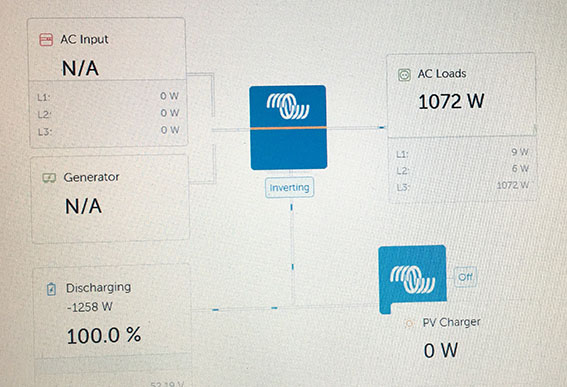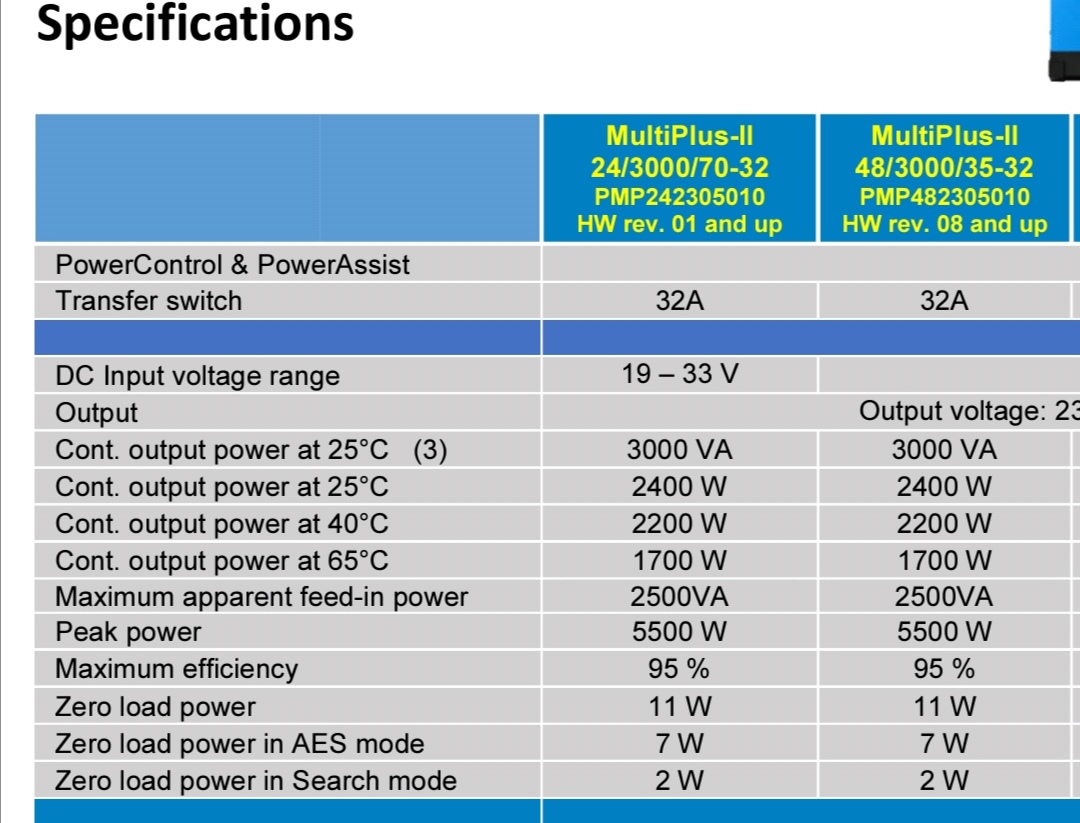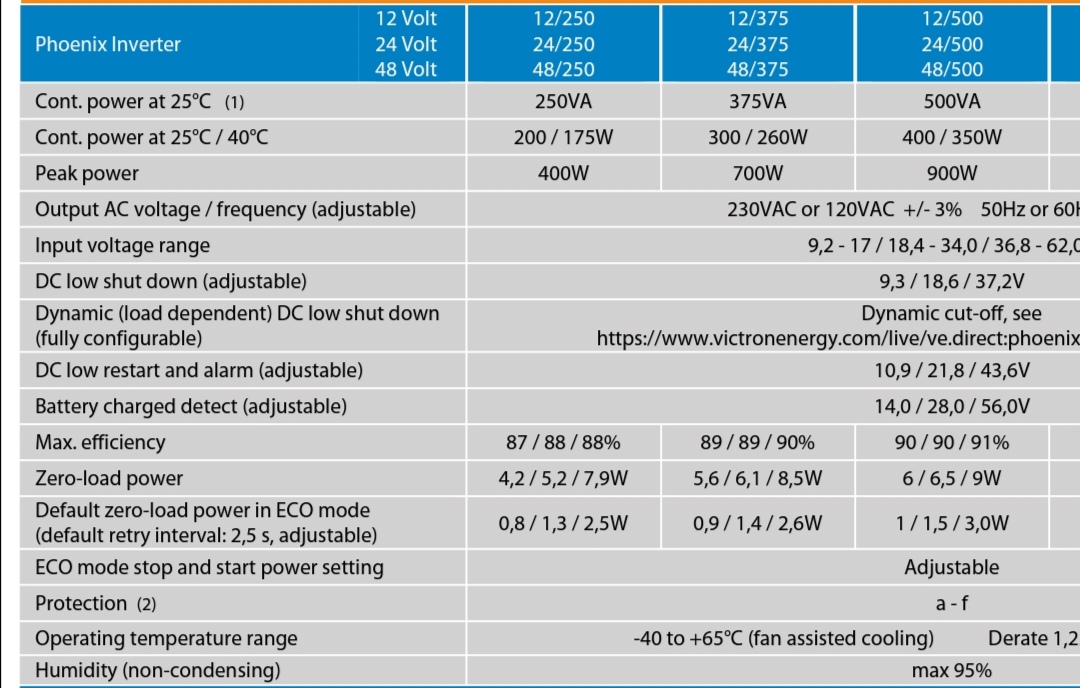Does anyone have a link to a graph or something? :-)
Thanks!
- Home
- Anonymous
- Sign in
- Create
- Spaces
- Grafana
- Node-Red
- Unsupported topics
- Questions & Answers
- Modifications
- Communauté francophone
- Deutschsprachiger Bereich
- Preguntas en Español
- Explore
- Topics
- Questions
- Ideas
- Articles
- Badges
question
How efficient is my Victron 12/500 inverter?
I have found it depends on your load and set up. So it is a difficult one to answer in a datasheet as there are so many variables. Even percentage load of inverter capacity is a factor.
The best way to know how efficient your personal setup is, is to run a known load on your system, and measure how much is being drawn from your battery and work out the percentage from there.
For example
I have a 24/3000 and am running my heating element of 1500W yest i am drawing 1600 watts from the battery I know I have about a 93% efficiency for that circuit and load. Of course I have a low frequency Multiplus inverter not a high frequency like the newer ones, this is also a factor to consider. Recently increased the battery cable size from 50mm to 95mm ad made the system more efficient that way.
I have used a simple element as an example of a load as it has a good power factor. Some led bulbs have a power factor of 0.5 so a 4w bulb can actually draw 8w from a system. So checking with a clamp meter on incoming and outgoing is helpful to see what side the inefficiency is.
Hi,
Are those numbers for real, or just mathematical an example?
My MP-II 48/3000 paints quite different picture.
Same type load (heating element) but efficiency is much lower.
Very disappointing 84.4%. :(
Regards,
Marek

W
No we used the color control as well. But checked numbers with a clamp meter.
Found interesting changes when
- Battery type was changed is from lithium to agm. Battery efficiency is a factor.
- Cable size changes as well we use 95mm now (makes sense as there will be less resistance). And the usual removal of extra things in the wiring and left just fusing and the bmv shunt. Good lug crimping also makes a difference. All resistance connections are important.
- The other thing that made a difference was measuring with the bmv shunt as the multi itself has no way to actually measure power from the battery. So the figure coming out is usually an assumed amount.
- Wiring on the ac output was also 'tuned up'
Thats why we say efficiency to some degree can be affected by setup.
We have a 24/3000 which is technically less efficient conversion wise.
Hi,
I understand all your points but, as you can see in my picture, the numbers are from MP-II unit itself.
It calculates incoming/outgoing power from battery/AC by measuring the current and voltage on its battery and AC terminals.
Cables, fuses shunts are out of this equation.
Regards,
Marek
Since voltage drop under load is an issue for most batteries the figures showing power out are not a measured thing only an assumed thing.
Cables fuses and shunts add resistance that makes voltage drop between the battery and the multi. So what the multi measures is not necessarily what is being drawn from the battery.
That's why shunts for bmv are placed near the battery.
Hi,
MP-II measures "V" and "I" at its terminals and has no clue what happens on the cables outside its box.
It does not care about the battery's voltage drop.
It measures voltage and current than calculates the power provided on the battery terminals and taken on the AC-out terminals.
Imagine yourself in the room with voltmeter, current meter and calculator.
With those you are measuring voltage and current in the junction box on the wall and calculate the power.
You do not know or care about the voltage in the power-plant 100km away or electrical oven next room.
Knowing power IN and power OUT you can calculate the efficiency of equipment in the room.
This room is the MP-II. :)
What I am trying to say is that I am not looking/asking for the efficiency of the whole system, from battery to refrigerator.
I am asking for the efficiency of the MP-II only.
Regards,
Marek
The datasheet has what you need.
Other resources to check out

More direct answer is found in the datasheet
Less long winded than the other answer. Probably more what you are asking for.

Nice thanks! :-)
I have two 120Ah batteries in parallel and my Mac Mini M1 and monitor is drawing around 4Amps, when in use and my LED smart light around half an amp... I am trying to see how long I can go between charges because in theory I should get around 24 hours of operation. I also wanted to check the batteries as I have had them just over a year and wanted to see how they were doing! :-)
Just wanted to check everything.
I'm about to install another 270W solar panel to bring my total to 810W as I am determined to be able to power all my needs from the sun even in the winter in England. Today I was drawing around 3Ah all day... I am in a motorhome not in situ somewhere! :-)
Hi,
If I understand your question correctly, you have 2x12v batteries 120Ah each.
That gives you 2880Wh of energy when they are fully charged.
If they are of Pb type, you can only use half of it if you want them to last the reasonable time.
Your load is 4A at 230V that makes it 920W per hour
If we assume that your inverter has 100% efficiency and 50% use of battery, you have around 1h and 33 minutes of battery power when there is no Sun to charge your battery.
Regards,
Marek
Here is a Graph of a 375 vs an old 3000 I measured. It is always a curve. Sweet spot is around half of nominal load which will be similar on your 500 unit. I am running 2 Inverters, above 200ish W load the little 375 uses more battery power than the big 3000 inverter. If you are off grid no load consumption is the more interesting value. 4W or 0.5W (eco mode) for the little one vs 12W for the 3000 vs 25W cheap chinese product 24/7
question details
26 People are following this question.
